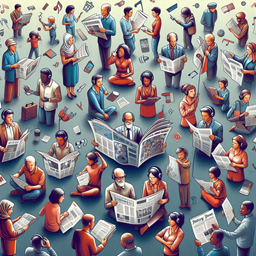By Ron Raskin

For many years, people in the West took free speech for granted. They became so accustomed to it that they stopped being cautious. And, as often happens, the moment they lowered their guard, free speech began to disappear, swallowed up by the heat of global politics.
It began with the “wild west” of free speech, which mirrored the darkest days of unchecked capitalism, when opportunists exploited the naive, monopolies crushed competition and the rich devoured the weak. Today, the same thing is happening with information: governments run influence campaigns, money decides who gets heard, and people are losing the ability to tell right from wrong.
Restrictions were then introduced to “protect society” from hate, lies, and foreign propaganda. But soon enough, this turned into open censorship:
- Social media platforms ban or silence accounts using vague rules that allow them to decide what is “acceptable” at any time.
- Search engines like Google use policies such as E-A-T (Expertise, Authoritativeness, Trustworthiness) and YMYL (Your Money or Your Life) to decide which sites to index. In practice, this often excludes independent voices — even those promoting peace, logic, and honest discussion of geopolitics.
Of course, there is a real tension between free speech and the need to stop hate and fake news. Hate should be opposed, lies should be challenged. But in reality, these measures are often used to silence anyone outside the mainstream. Every dictatorship in history has begun this way: promising to protect people, fight lies, or defend justice — but ending in oppression.
Censorship is not a solution — it is a danger, and it must be prohibited. There are better ways to fight lies and hate through regulation rather than censorship. Only speech specifically prohibited by law, and that can be challenged in court, should be restricted as hate speech. Everything else must remain allowed — but regulated.
The goal of this regulation should be to make sure all voices are heard equally — it’s not the size of the group that matters, but the diversity and uniqueness of the voices. People should be warned about biased information, including fake news, not shielded from it. Any social group, political party, or nation that agrees to follow this regulation will have their voice heard, and in return, they must also listen to others. Just as every citizen has rights and responsibilities under the law, anyone taking part in this regulation will have both rights and obligations.
It took time to build the current liberal society, where freedom and personal rights are in balance. It is time to do the same for social groups. It is time for the right to be heard, and the right to be warned.

